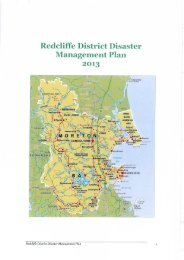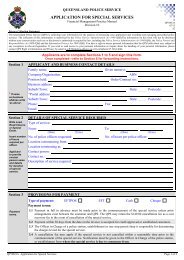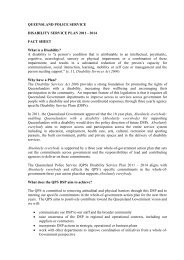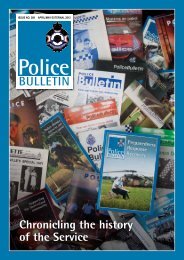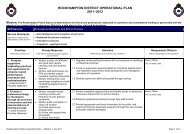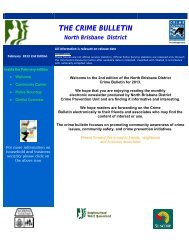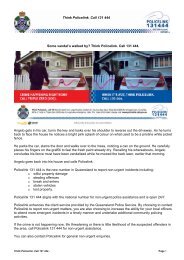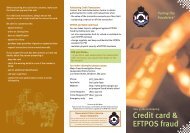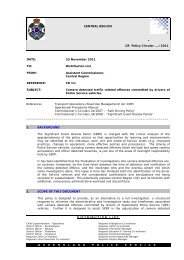Community Safety and Engagement - Queensland Police Service ...
Community Safety and Engagement - Queensland Police Service ...
Community Safety and Engagement - Queensland Police Service ...
You also want an ePaper? Increase the reach of your titles
YUMPU automatically turns print PDFs into web optimized ePapers that Google loves.
Output 1<br />
<strong>Community</strong> <strong>Safety</strong> <strong>and</strong><br />
<strong>Engagement</strong><br />
Our goal is to foster healthy individuals <strong>and</strong> communities through crime prevention <strong>and</strong> proactive policing partnerships.<br />
26<br />
With honour we serve<br />
Output 1: <strong>Community</strong> <strong>Safety</strong><br />
<strong>and</strong> <strong>Engagement</strong>
<strong>Community</strong> <strong>Safety</strong> <strong>and</strong> <strong>Engagement</strong><br />
Key focus areas:<br />
• Public order <strong>and</strong> safety<br />
• Crime prevention <strong>and</strong> community partnerships<br />
• Civil emergencies <strong>and</strong> major events<br />
<strong>Community</strong> safety <strong>and</strong> engagement is focused on the<br />
prevention of crime, engagement with the community<br />
<strong>and</strong> providing policing services that preserve public<br />
safety <strong>and</strong> good order during civil emergencies <strong>and</strong><br />
special events.<br />
Engaging the community is a critical component in<br />
addressing both the causes of crime <strong>and</strong> preventing<br />
crime. Over the past decade, community policing <strong>and</strong><br />
problem-oriented policing have increasingly focused<br />
on identifying the causes of crime <strong>and</strong> engaging the<br />
community in resolving crime related issues.<br />
<strong>Community</strong> engagement also helps to ensure service<br />
delivery is appropriate, focused <strong>and</strong> effective. Together,<br />
these activities contribute to developing safe <strong>and</strong> secure<br />
communities.<br />
Output expenditure:<br />
2008-09 479M<br />
2007-08 434M<br />
2006-07 381M<br />
2005-06 346M<br />
2004-05 307M<br />
0<br />
50M 150M 200M 250M 300M 350M 400M 450M<br />
500M<br />
Strategies<br />
• Manage calls for service in a professional, ethical <strong>and</strong> responsive manner underpinned by a `client service´<br />
philosophy<br />
• Monitor <strong>and</strong> address perceptions of safety <strong>and</strong> security within the community through high-visibility presence,<br />
interaction, client follow up <strong>and</strong> reassurance<br />
• Ensure timely responses to incidents of anti-social behaviour <strong>and</strong> develop programs to reduce such occurrences<br />
• Develop, implement <strong>and</strong> evaluate focused <strong>and</strong> innovative policing <strong>and</strong> crime prevention initiatives, guided by<br />
intelligence, analysis <strong>and</strong> research<br />
• Promote crime prevention initiatives on a whole-of-Government <strong>and</strong> community basis<br />
• Engage in <strong>and</strong> foster effective partnerships <strong>and</strong> networks with the community, government agencies <strong>and</strong> the<br />
private sector to identify <strong>and</strong> address the causes of crime <strong>and</strong> anti-social behaviour<br />
• Plan for <strong>and</strong> allocate sufficient resources to manage <strong>and</strong> police major <strong>and</strong> special events, emergencies, disasters<br />
<strong>and</strong> terrorist incidents<br />
Output 1: <strong>Community</strong> <strong>Safety</strong><br />
<strong>and</strong> <strong>Engagement</strong><br />
With honour we serve 27
Conducted Energy Devices provide a safer method for dealing<br />
with dangerous <strong>and</strong> violent offenders with minimal long-term<br />
injuries to both offenders <strong>and</strong> arresting officers.<br />
Safer law enforcement<br />
The distribution of Conducted Energy Devices (CEDs)<br />
to police districts throughout the State commenced in<br />
January 2009 as part of the three-year rollout schedule.<br />
Key focus area—Public order <strong>and</strong><br />
safety<br />
Preservation of public order<br />
New laws were passed by State Parliament on<br />
25 November 2008 that enabled a 12-month trial of<br />
a new ticketing system permitting the issue of on-thespot-fines<br />
for public nuisance, public urination <strong>and</strong><br />
associated offences.<br />
It is anticipated the new system will free up the courts<br />
by removing thous<strong>and</strong>s of public nuisance offences<br />
each year. <strong>Police</strong> will also spend less time on court work<br />
<strong>and</strong> will be able to devote more time to police work in<br />
the community.<br />
This trial, to be completed by 31 December 2009, will<br />
allow an evaluation of the fairness <strong>and</strong> cost effectiveness<br />
of ticketing provisions for dealing with public nuisance<br />
offences, which would then inform any decision by<br />
Government to exp<strong>and</strong> ticketing across the State.<br />
The QPS has developed a comprehensive training <strong>and</strong><br />
policy framework to ensure appropriate use of the CEDs.<br />
Significant Event Review Panels have been established<br />
in each region <strong>and</strong> comm<strong>and</strong> to overview CED<br />
presentations <strong>and</strong> deployments in line with QPS policy.<br />
Special information sessions were delivered to<br />
Indigenous communities across the State between<br />
January <strong>and</strong> March 2009. These sessions focused on<br />
how the CED works, the policy framework, training<br />
officers received, how usage is overviewed <strong>and</strong><br />
monitored—emphasising it was just another tool that<br />
would help ensure the safety of offenders, officers <strong>and</strong><br />
byst<strong>and</strong>ers.<br />
A total of 1 240 CEDs were distributed by June 30, <strong>and</strong><br />
in addition to 248 trainers, 2 600 officers have been<br />
trained in their use.<br />
As at 30 June 2009, CEDs had been presented 291 times.<br />
There had been 69 actual deployments. On 222 occasions<br />
the presence of a CED defused a situation <strong>and</strong> caused<br />
the person concerned to comply with police directions.<br />
While this roll out followed a twelve month trial,<br />
on Monday 15 June 2009 the Minister for <strong>Police</strong><br />
announced a joint Crime <strong>and</strong> Misconduct Commission<br />
<strong>and</strong> Queensl<strong>and</strong> <strong>Police</strong> <strong>Service</strong> Review of CED training<br />
<strong>and</strong> operational policies. This was due to a serious<br />
incident which occurred on 12 June 2009 which<br />
involved the deployment of a CED by a Queensl<strong>and</strong><br />
<strong>Police</strong> <strong>Service</strong> officer.<br />
28<br />
With honour we serve<br />
Output 1: <strong>Community</strong> <strong>Safety</strong><br />
<strong>and</strong> <strong>Engagement</strong>
Personal safety <strong>and</strong> protective behaviours<br />
The Protective Behaviours program aims to enhance the<br />
problem-solving <strong>and</strong> communications skills of people of<br />
all ages <strong>and</strong> encourages individuals to identify unsafe<br />
or potentially unsafe situations.<br />
In 2008-09 the QPS performed an in-depth review of the<br />
Protective Behaviours program. The review identified<br />
the need for an enhanced child safety program.<br />
The <strong>Service</strong> is currently considering the adoption of the<br />
Safe Start: Protective Behaviours for Children <strong>and</strong> Young<br />
People program. This program seeks to maximise the<br />
safety <strong>and</strong> enhance the wellbeing of children <strong>and</strong> young<br />
people by equipping them <strong>and</strong> concerned adults, with an<br />
awareness of risks <strong>and</strong> key safety concepts <strong>and</strong> strategies.<br />
<strong>Community</strong> safety<br />
<strong>Community</strong> <strong>Police</strong> Beats<br />
Neighbourhood <strong>Police</strong> Beats consist of a police officer<br />
working <strong>and</strong> living from the office/residence within<br />
a beat area. The police officer is responsible for<br />
addressing the policing needs of the community within<br />
that area <strong>and</strong> research indicates reported crime rates<br />
have declined as a result.<br />
• an update of the Confident Safe <strong>and</strong> Secure<br />
H<strong>and</strong>book <strong>and</strong> Senior Wiser Safer Directory<br />
• translation of these resources into other languages<br />
• the development of a seniors’ specific website,<br />
providing a one stop shop for seniors to prepare<br />
themselves to recognise crime risks <strong>and</strong> take<br />
proactive steps to prevent them.<br />
Policing Queensl<strong>and</strong>’s rail networks<br />
During the 2008-09 financial year the <strong>Police</strong> Railway<br />
Squad deployed to 191 operations targeting good order<br />
offences, fare evasion <strong>and</strong> criminal activity on the QR<br />
Citytrain Network. The Squad conducted over 28 000<br />
hours of network patrols including deployments to<br />
major horse racing events, sporting games at Suncorp<br />
Stadium <strong>and</strong> Skilled Park, <strong>and</strong> concerts at the Boondall<br />
Entertainment Centre.<br />
During this period a total of 8 737 people of interest<br />
were intercepted, with 1 188 people arrested for 2 181<br />
charges <strong>and</strong> 2 739 infringement notices issued. The<br />
Railway Squad also provided specialist support to<br />
regional police actions targeting criminal activity along<br />
the rail corridor.<br />
In 2008-09, two new Neighbourhood <strong>Police</strong> Beats<br />
became operational at Logan Village <strong>and</strong> Woolloongabba<br />
(the Gabba Neighbourhood <strong>Police</strong> Beat).<br />
There are now 60 Neighbourhood <strong>Police</strong> Beats in<br />
Queensl<strong>and</strong>. No new police beats are planned for<br />
2009-10.<br />
Safe schools<br />
The ‘Policing Schools Program’ encompasses full<br />
time School Based <strong>Police</strong> Officers who are based at<br />
47 secondary schools across the State <strong>and</strong> Adopt-a-<br />
Cops who volunteer their time on a part-time basis to<br />
work with their local primary schools. Both programs<br />
promote positive relationships between the school<br />
community <strong>and</strong> police. There are currently 35 school<br />
based police officer positions <strong>and</strong> approximately 654<br />
Adopt-a-Cops.<br />
School Based <strong>Police</strong> Officers work in partnership with<br />
other areas of the <strong>Service</strong> <strong>and</strong> with the school community<br />
to develop better relationships, receive better information<br />
<strong>and</strong> provide better safety education outcomes.<br />
<strong>Safety</strong> <strong>and</strong> security for seniors<br />
Two seniors’ forums were held during the year, bringing<br />
together government, non-government agencies <strong>and</strong><br />
community groups to discuss issues affecting seniors<br />
<strong>and</strong> to develop effective strategies.<br />
A range of initiatives have been progressed in 2008-09,<br />
including:<br />
• a police training DVD addressing effective<br />
communication with seniors<br />
Constable Warren Broughton, also known as ‘Constable Wozza’,<br />
has been warmly received by Bundaberg’s St Mary’s Catholic<br />
School.<br />
Output 1: <strong>Community</strong> <strong>Safety</strong><br />
<strong>and</strong> <strong>Engagement</strong><br />
With honour we serve 29
Policing Queensl<strong>and</strong>’s waterways<br />
Water <strong>Police</strong> officers provide a policing presence, both<br />
proactive <strong>and</strong> reactive, on <strong>and</strong> around Queensl<strong>and</strong><br />
waterways. There are 11 full time water police stations<br />
throughout the State, in addition to 12 general duties<br />
stations in isolated areas which have small vessels. The<br />
<strong>Service</strong> has a fleet of 67 vessels <strong>and</strong> jet skis.<br />
Between December 2008 <strong>and</strong> January 2009 the statewide<br />
operation ‘Summer Safe 2008-2009’ focused on the<br />
enforcement of maritime legislation <strong>and</strong> r<strong>and</strong>om breath<br />
testing on Queensl<strong>and</strong> waterways. Each Water <strong>Police</strong><br />
station tailored their operations to address local issues.<br />
Close to 1 300 Marine Infringement Notices were issued<br />
statewide, with the most prevalent offences being for<br />
failing to carry the prescribed safety equipment (30%)<br />
<strong>and</strong> for speeding offences (25%). Inappropriate jet ski<br />
activity on the Gold Coast continued to be a significant<br />
factor, with 33 notices issued out of a total of 44<br />
statewide.<br />
Due to the success of the Summer Safe Operation<br />
2008-09, statewide operations will continue to be<br />
planned to target peak boating periods.<br />
The Diving Squad’s Side Scan Sonar, so named because<br />
it operates from behind a vessel rather than beneath<br />
it, proved its worth for use in underwater recovery<br />
jobs during this reporting period. The device was<br />
successfully used in locating the FV Dynasty which<br />
was lost in the Torres Strait in May 2009; a small plane<br />
which crashed off the Gold Coast in September 2008;<br />
<strong>and</strong> an unknown sunken commercial fishing vessel off<br />
Hervey Bay in June 2009.<br />
Since its purchase in October 2007, the Side Scan Sonar<br />
has been deployed 35 times with a 100% success rate.<br />
The Water <strong>Police</strong> capabilities were further strengthened<br />
during 2008-09 with 18 projects being undertaken<br />
under the Vessel Management Program. The <strong>Service</strong><br />
will undertake 11 projects under this program during<br />
the 2009-10 financial year. (More on page 96).<br />
Policing Queensl<strong>and</strong>’s diversity<br />
The Queensl<strong>and</strong> Government Multicultural Policy<br />
‘Multicultural Queensl<strong>and</strong>—making a world of difference’<br />
is the blueprint for managing diversity for the benefit of<br />
all Queensl<strong>and</strong>ers. This Policy requires each government<br />
department to produce <strong>and</strong> publish multicultural action<br />
plans which demonstrate how they have integrated<br />
multicultural principles <strong>and</strong> practices into core business,<br />
<strong>and</strong> to report annually on progress <strong>and</strong> achievements.<br />
The QPS Multicultural Action Plan <strong>and</strong> reporting are<br />
available on the QPS website. Some of the highlights<br />
gleaned through this reporting mechanism are:<br />
Cultural liaison/cultural awareness<br />
The <strong>Police</strong> Liaison Officer (PLO) scheme provides a<br />
liaison <strong>and</strong> consultation interface between culturally<br />
diverse communities <strong>and</strong> the police. PLOs are not<br />
sworn police <strong>and</strong> do not possess police powers.<br />
There are currently 152 PLO positions throughout<br />
the State, including approximately 24 allocated to<br />
discrete Indigenous communities including Horn Isl<strong>and</strong>,<br />
Mornington Isl<strong>and</strong>, Thursday Isl<strong>and</strong>, Yarrabah, Palm<br />
Isl<strong>and</strong> <strong>and</strong> Woorabinda. While the majority of the<br />
positions are occupied by people of Aboriginal <strong>and</strong><br />
Torres Strait Isl<strong>and</strong>er backgrounds, the scheme has now<br />
grown to incorporate officers from a number of other<br />
communities including the Sudanese, Pacific Isl<strong>and</strong>er,<br />
Muslim/Arabic, Vietnamese, Chinese <strong>and</strong> Australian<br />
South Sea Isl<strong>and</strong>er communities.<br />
PLOs have been active in a number of programs <strong>and</strong><br />
projects including:<br />
• St George <strong>Police</strong> ‘Re-visit Program’ which received<br />
the Queensl<strong>and</strong> Government 2009 Domestic <strong>and</strong><br />
Family Violence Prevention Award.<br />
(More on page 36)<br />
• <strong>Community</strong> of Origin Follow Up program (COFUP)<br />
in Townsville which aims to ensure Indigenous<br />
prisoners from the outer communities get home<br />
safely after being released from Stuart Prison.<br />
• ‘Elder patrols’ in the Brisbane City <strong>and</strong> Fortitude<br />
Valley areas. These patrols utilise the skills of<br />
respected community members, police officers<br />
<strong>and</strong> PLOs. The ‘team’ engages with members of<br />
the community at relevant times to prevent crime,<br />
enhance community safety <strong>and</strong> promote alternative<br />
solutions to social problems.<br />
Cultural appreciation<br />
The <strong>Service</strong> administers a Cultural Appreciation Project<br />
that focuses on education <strong>and</strong> training for police<br />
officers <strong>and</strong> staff members in relation to policing<br />
Aboriginal <strong>and</strong> Torres Strait Isl<strong>and</strong>er communities.<br />
The project team in partnership with the Human<br />
Resource Development Branch has:<br />
• reviewed the cultural awareness training provided in<br />
the <strong>Police</strong> Recruit Operational Vocational Education<br />
Program<br />
• revised the three Competency Acquisition program<br />
workbooks that deal with Indigenous issues to<br />
provide the generic knowledge component of the<br />
base package<br />
• developed community specific packages for officers<br />
who are about to take up positions in specific<br />
Aboriginal <strong>and</strong> Torres Strait Isl<strong>and</strong>er communities.<br />
Fourteen community specific information packages,<br />
including Aurukun, Cherbourg, Doomadgee,<br />
30<br />
With honour we serve<br />
Output 1: <strong>Community</strong> <strong>Safety</strong><br />
<strong>and</strong> <strong>Engagement</strong>
Hope Vale, Kowanyama, Lockhart River, Mapoon,<br />
Mornington Isl<strong>and</strong>, Napranum, Northern Peninsula<br />
area, Palm Isl<strong>and</strong>, Pormpuraaw, Woorabinda <strong>and</strong><br />
Wujal Wujal have been completed <strong>and</strong> are available<br />
to officers commencing duties in these communities.<br />
Multicultural on-line learning<br />
The Multicultural Awareness Online Learning Product<br />
is an interactive web-based course for police which has<br />
been designed to increase police officers’ knowledge<br />
of other cultures so they can interact more effectively<br />
with the public <strong>and</strong> colleagues. This course was<br />
developed <strong>and</strong> funded within the QPS Human Resources<br />
Development Branch.<br />
Multicultural quick reference guides (QRG)<br />
Multicultural Quick Reference Guides are summaries<br />
about communities, developed specifically for use<br />
by operational police. The first four guides were<br />
completed during the year <strong>and</strong> a further 12 are expected<br />
to be completed in 2009-10.<br />
The guides contain country <strong>and</strong> community profiles,<br />
police multicultural resources, recent police support<br />
<strong>and</strong> initiatives, details of interpreting services, common<br />
phrases, a guide to religions, diplomatic <strong>and</strong> consular<br />
support <strong>and</strong> community organisation contact details.<br />
On June 9, Sergeant Dimitrios (Jim) Bellos, Cross Cultural Liaison Officer, Metropolitan<br />
South Region, was announced by the Premier as the winner of the Suncorp Queensl<strong>and</strong>er<br />
of the Year award. Sergeant Bellos was recognised for his work in fostering better<br />
relations <strong>and</strong> interaction between the QPS <strong>and</strong> ethnic communities. This is the first time<br />
the prestigious award has ever been won by a member of the <strong>Service</strong>.<br />
Output 1: <strong>Community</strong> <strong>Safety</strong><br />
<strong>and</strong> <strong>Engagement</strong><br />
With honour we serve 31
The Multicultural QRG project aims to help the QPS<br />
provide the community with appropriate <strong>and</strong> nondiscriminatory<br />
policing services by enhancing the<br />
capacity <strong>and</strong> knowledge of its members.<br />
Crowd management<br />
The Mounted <strong>Police</strong> Unit, along with other areas of the<br />
<strong>Service</strong>, continued to provide high visibility patrols<br />
throughout police operations <strong>and</strong> at major events. This<br />
acts as a significant deterrent to offenders <strong>and</strong> provides<br />
patrons at events with a very visible police presence to<br />
enhance overall safety <strong>and</strong> security.<br />
Major events serviced throughout the year included:<br />
ANZAC Day, Brisbane Riverfire, Indy Car Carnival,<br />
<strong>Police</strong> Remembrance Day, Schoolies Celebrations,<br />
2008 Royal Queensl<strong>and</strong> Show <strong>and</strong> the Woodford Folk<br />
Festival.<br />
Dignitary protection<br />
The State Security Operations Group provided dignitary<br />
protection <strong>and</strong> protective security intelligence for the<br />
annual Australian Leadership Retreat held at Hayman<br />
Isl<strong>and</strong> in August 2008. The forum was attended by the<br />
Governor-General, the Prime Minister, State Premiers,<br />
senior Federal Cabinet Ministers <strong>and</strong> foreign dignitaries.<br />
The State election, held in March 2009, saw the Premier<br />
<strong>and</strong> the Leader of the Opposition travel throughout<br />
the State during the 26 day campaign period. The<br />
State Security Operations Group, with regionally based<br />
dignitary protection personnel, provided protective<br />
security to both leaders during the campaign visits.<br />
<strong>Police</strong> from a variety of regions <strong>and</strong> comm<strong>and</strong>s<br />
enhanced their dignitary protection skills by attending<br />
a Dignitary Protection Training course in May 2009. To<br />
ensure members maintain their skills, three-day training<br />
sessions are conducted by State Security Operations<br />
Group members in Brisbane <strong>and</strong> Cairns at various times<br />
throughout the year.<br />
There are 214 officers across the State qualified to<br />
provide dignitary protection services.<br />
Regional activities<br />
Special Needs Action Plan with <strong>Police</strong> (SNAPP)<br />
‘Vulnerable people <strong>and</strong> the criminal justice system’ is<br />
one of the <strong>Service</strong>'s strategic priorities for 2008-09. In<br />
this regard, the Logan District SNAPP project includes<br />
helping first response officers deal with people who are<br />
vulnerable including children. As part of the project<br />
Logan District has identified 19 local police officers who<br />
have volunteered to be Special Needs Liaison Officers.<br />
Special Needs Liaison Officers aim to facilitate outcomes<br />
<strong>and</strong> develop communication between the QPS, service<br />
providers, special needs organisations <strong>and</strong> people with<br />
special needs.<br />
A QPRIME toolkit has been developed for the consistent<br />
recording of SNAPP information <strong>and</strong> for ongoing<br />
evaluation purposes.<br />
Safe schools<br />
Numerous programs <strong>and</strong> initiatives in the Gold Coast<br />
District address problems relating to youth crime.<br />
These programs <strong>and</strong> initiatives tackle the issues of<br />
truancy, bullying in the school yard—both physical <strong>and</strong><br />
electronically, graffiti, wilful damage <strong>and</strong> trespassing.<br />
Some initiatives include:<br />
• ‘Extreme Dreams’ – an initiative that works with<br />
youth in the community who have disengaged from<br />
school, family <strong>and</strong> friends. The project encourages<br />
self esteem <strong>and</strong> leadership <strong>and</strong> creates a partnership<br />
with agencies that h<strong>and</strong>le mutual responsibilities in<br />
resolving the young person’s difficulties.<br />
• ‘Cool Heads’ – a street outreach program for<br />
youth on the southern end of the Gold Coast. The<br />
project adopts an holistic approach <strong>and</strong> includes<br />
engagement, education <strong>and</strong> support for young people<br />
to improve community safety <strong>and</strong> reduce violence,<br />
anti-social behaviour <strong>and</strong> crime.<br />
• ‘Good Reward’—relates to school aged youth across<br />
the Gold Coast being rewarded with McDonald’s food<br />
vouchers for wearing cycling helmets, not engaging<br />
in anti-social behaviour <strong>and</strong> attendance at school.<br />
This project is building rapport between the youth of<br />
the Gold Coast <strong>and</strong> police to help prevent crime.<br />
32<br />
With honour we serve<br />
Output 1: <strong>Community</strong> <strong>Safety</strong><br />
<strong>and</strong> <strong>Engagement</strong>
Key focus area—Crime prevention<br />
<strong>and</strong> community partnerships<br />
Drug <strong>and</strong> alcohol initiatives<br />
The <strong>Service</strong> continued to investigate <strong>and</strong> address<br />
the links between drugs, alcohol, substance misuse<br />
<strong>and</strong> violence. Partnerships with other government<br />
departments, non-government agencies <strong>and</strong> the<br />
community are aimed at implementing strategies to<br />
reduce alcohol <strong>and</strong> drug-related harm.<br />
Specialist court programs<br />
The aim of these programs is to help suitably motivated<br />
drug or alcohol offenders overcome their problematic<br />
drug or alcohol use <strong>and</strong> end their associated criminal<br />
behaviour. The QPS is an important partner in many of<br />
these programs:<br />
Drug Court Program<br />
The Drug Court Program is a Queensl<strong>and</strong> Government<br />
funded initiative aimed at drug dependent offenders<br />
with a long criminal history.<br />
Adult offenders who would otherwise be facing<br />
imprisonment for non-violent offences are offered<br />
the option of rehabilitation <strong>and</strong> are sentenced to an<br />
Intensive Drug Rehabilitation Order. The offender is<br />
re-sentenced following their successful or unsuccessful<br />
completion of the rehabilitation program which<br />
generally lasts for 18 months. The Drug Court Program<br />
is an initiative designed to break the link between drug<br />
use <strong>and</strong> crime.<br />
The Queensl<strong>and</strong> Indigenous Alcohol Diversion<br />
Program<br />
The Queensl<strong>and</strong> Indigenous Alcohol Diversion<br />
Program (QIADP) is designed to address Indigenous<br />
overrepresentation in the criminal justice <strong>and</strong> child<br />
protection systems. The criminal justice stream of<br />
QIADP is a pre-sentence bail based diversion program<br />
for defendants whose alcohol misuse is related to<br />
their offending. Under the voluntary program, eligible<br />
people are placed in individual treatment <strong>and</strong> case<br />
management programs lasting up to 20 weeks. The<br />
program provides treatment places in districts in three<br />
regions including Cairns which has 40 treatment<br />
places; Townsville which has 50 treatment places; <strong>and</strong><br />
Rockhampton which has 40 treatment places.<br />
The pilot will continue until 30 June 2010.<br />
The Queensl<strong>and</strong> Magistrates Early Referral into<br />
Treatment Program (QMERIT)<br />
QMERIT is a pre-sentence bail based program which<br />
refers defendants into treatment <strong>and</strong> rehabilitation for<br />
3 – 4 months prior to sentencing. Successful<br />
completion of the program should result in a mitigation<br />
of penalty. QMERIT targets illicit drug offenders<br />
whose drug use has contributed to their offending <strong>and</strong><br />
generally excludes offences of serious personal violence<br />
<strong>and</strong> of a sexual nature. The pilot will continue until 30<br />
June 2010.<br />
Alcohol Court Diversion Program<br />
The Alcohol Court Diversion Program is an eight week<br />
pre-sentence bail-based court program for adults <strong>and</strong><br />
young people who have been charged with an alcohol<br />
related offence <strong>and</strong> admitted guilt. A twelve month<br />
pilot program commenced in the Caloundra Magistrates<br />
Court in April 2009.<br />
<strong>Police</strong> Drug Diversion Program<br />
The <strong>Police</strong> Drug Diversion Program aims to modify the<br />
behaviour of persons found in possession of up to 50<br />
grams of cannabis <strong>and</strong>/or utensils <strong>and</strong> with little or no<br />
past contact with the criminal justice system. During<br />
2008-09 diversion was offered to over 6 000 people<br />
throughout Queensl<strong>and</strong>.<br />
A compliance rate of about 80% for those attending<br />
assessment <strong>and</strong> education programs has been achieved.<br />
Liquor <strong>and</strong> minors<br />
Underage drinking is associated with a range of<br />
problems that require police attention.<br />
Amendments to the Liquor Act 1992 now further<br />
restrict the supply of liquor to minors on private<br />
premises. Any person other than a responsible adult<br />
who supplies liquor to a minor at a private place is now<br />
breaking the law.<br />
As at 30 June 2009, five charges have been preferred<br />
against adults who have supplied liquor to minors<br />
under the new laws.<br />
New police powers under subsection 53A of the <strong>Police</strong><br />
Powers <strong>and</strong> Responsibilities Act 2000 also allow police<br />
to seize alcohol that has the potential to cause harm to<br />
minors or that is being recklessly provided to minors.<br />
<strong>Police</strong> can confiscate alcohol in cars <strong>and</strong> private <strong>and</strong><br />
public places, <strong>and</strong> dispose of alcohol they reasonably<br />
suspect is destined for unsupervised consumption by<br />
minors.<br />
Output 1: <strong>Community</strong> <strong>Safety</strong><br />
<strong>and</strong> <strong>Engagement</strong><br />
With honour we serve 33
Party Safe<br />
The Party Safe initiative has continued to provide<br />
information <strong>and</strong> resources for the community to ensure<br />
people are informed about how to hold a successful,<br />
enjoyable <strong>and</strong> safe party. Up to the end of June 2009<br />
over 23 000 brochures <strong>and</strong> 2 700 posters have been<br />
distributed. Non-reusable Party Safe wristb<strong>and</strong>s<br />
were introduced in 2008 with over 90 000 distributed<br />
throughout Queensl<strong>and</strong> so far. These wristb<strong>and</strong>s assist<br />
in identifying uninvited guests at parties.<br />
The Party Safe information is also available on the<br />
QPS internet site, with an average of just under 500<br />
registration forms downloaded each month in 2008-09.<br />
During this reporting period almost 6 000 parties have<br />
been registered with police.<br />
One Punch Can Kill<br />
The One Punch Can Kill campaign goes h<strong>and</strong>-inh<strong>and</strong><br />
with the Queensl<strong>and</strong> <strong>Police</strong> <strong>Service</strong>’s Party Safe<br />
initiative. The campaign seeks to help young people,<br />
particularly men between the ages of 15 <strong>and</strong> 25, to<br />
realise that a split-second decision to engage in violence<br />
can have enormous consequences. The One Punch Can<br />
Kill slogan is a reminder that a simple act of violence<br />
can ruin many lives. The campaign also targets girls<br />
<strong>and</strong> women with the slogan ‘I support blokes who don’t<br />
fight’.<br />
This campaign is supported by key community<br />
groups including the Queensl<strong>and</strong> Homicide Victims<br />
Support Group <strong>and</strong> the Matthew Stanley Foundation.<br />
Since 2 February 2008, more than 31 000 people<br />
have visited the ‘One Punch Can Kill’ website (www.<br />
onepunchcankill.qld.gov.au), resulting in over 177 000<br />
page requests. The online game on the website has<br />
been played 6 000 times. Additionally, over 6 900<br />
people have joined the campaign supporters’ group on<br />
Facebook.<br />
Online advertising has reached more than one million<br />
users with the advertisements appearing 19.4 million<br />
times on MySpace, Facebook, Yahoo <strong>and</strong> Hotmail. The<br />
outdoor inflatable display has been used at more than<br />
20 events, exposing the campaign to tens of thous<strong>and</strong>s<br />
in the target age group.<br />
Drug detection<br />
The Brisbane Dog Squad provided drug detection<br />
support to operational police in all parts of Queensl<strong>and</strong>.<br />
The Drug Detection Dog Unit attended 586 jobs <strong>and</strong><br />
conducted 389 searches during the financial year, which<br />
resulted in significant seizures of drugs, firearms <strong>and</strong><br />
property.<br />
The Drug Detection Dog Unit is assisting with Operation<br />
‘Weed it out’. (More on page 41). This initiative has<br />
been developed in partnership with North Queensl<strong>and</strong><br />
Indigenous communities <strong>and</strong> targets drug use in these<br />
communities.<br />
Crime prevention initiatives<br />
<strong>Community</strong> safety <strong>and</strong> crime prevention<br />
The QPS provides funding for crime prevention<br />
projects across the State through the <strong>Community</strong> Crime<br />
Prevention Fund. The Fund supports partnerships<br />
between the QPS <strong>and</strong> community groups to develop<br />
local responses to local problems. In 2008-09 a diverse<br />
range of projects were funded including:<br />
• Red Dust Healing (Central Region) targeted<br />
at members of the Indigenous community in<br />
Woorabinda with a focus on anti-social behaviour,<br />
interpersonal violence, wilful damage, sexual<br />
offences <strong>and</strong> family violence. The success of the<br />
program is highlighted by a very low rate of reoffending<br />
among the participants.<br />
• Burglar Beware (North Coast Region) which involves<br />
an intense media campaign aimed primarily at burglars<br />
rather than the traditional campaigns that target the<br />
victim. The intended message to burglars includes<br />
that they are being watched by the community; <strong>and</strong><br />
the consequences of their actions. (More on page 56).<br />
• School Crime Stoppers Signs (South East Region)<br />
which were installed at 113 State <strong>and</strong> private schools<br />
across the Gold Coast <strong>and</strong> Logan police districts.<br />
They aim to encourage primary <strong>and</strong> secondary<br />
school students to report crime <strong>and</strong> safety concerns<br />
to Crime Stoppers.<br />
• Love Bites (Southern Region) aimed directly at high<br />
school students in the Toowoomba community to<br />
tackle family violence <strong>and</strong> prevent sexual assault,<br />
while addressing gender stereotypes <strong>and</strong> encouraging<br />
young people to seek help from friends <strong>and</strong> local<br />
service providers.<br />
The campaign is currently in an evaluation phase but<br />
promotion continues through the website, Facebook <strong>and</strong><br />
the inflatable display.<br />
34<br />
With honour we serve<br />
Output 1: <strong>Community</strong> <strong>Safety</strong><br />
<strong>and</strong> <strong>Engagement</strong>
Youth violence prevention<br />
The Youth Violence Prevention Funding Grant was a<br />
one-off allocation of up to $150 000 from the 2008-<br />
09 <strong>Community</strong> Crime Prevention Fund that supported<br />
initiatives specifically aimed at the prevention <strong>and</strong><br />
reduction of youth violence. Eight projects from across<br />
the State were approved for funding:<br />
• Streetwise – Sunnybank<br />
• Hard Yakka – Maroochydore<br />
• Barambah Family Project – Cherbourg<br />
• CoolHeads – Coolangatta/Tweed Heads<br />
• Learn to Dig the Didge – Inala<br />
• Riverscape – Surat<br />
• Logan High Schools Multicultural Connect Program<br />
– Logan<br />
• Say No to Violence – Kirwan<br />
These projects will be progressed during 2009-10.<br />
Youth Violence Taskforce<br />
From November 2006 to November 2007 the Youth<br />
Violence Taskforce examined ways to reduce violence<br />
among young people <strong>and</strong> made 16 recommendations<br />
in its report Youth Violence in Queensl<strong>and</strong> 2007. The<br />
recommendations primarily focused on youth <strong>and</strong><br />
alcohol, education, positive values <strong>and</strong> behaviour,<br />
group <strong>and</strong> social violence, positive youth framework<br />
<strong>and</strong> engagement, families <strong>and</strong> behaviour management.<br />
So far, 15 of the 16 recommendations have been<br />
implemented. The remaining recommendation has been<br />
substantially progressed in conjunction with the<br />
Department of Education <strong>and</strong> Training. It requires<br />
development of an educational program on communication<br />
<strong>and</strong> tactical withdrawal skills for secondary school<br />
students, <strong>and</strong> will commence in 2009-10.<br />
A Ministerial Advisory Council (recommendation 16)<br />
formed in 2008 continues to advise Government on<br />
emerging youth trends <strong>and</strong> culture issues in relation<br />
to violence. Three meetings have been held to-date<br />
discussing youth groups/gangs, youth forums, schoolies,<br />
youth engagement <strong>and</strong> youth <strong>and</strong> alcohol.<br />
Youth Violence Forum<br />
A Youth Violence Forum was held on Wednesday 27<br />
August 2008. The purpose of the Forum was to identify<br />
the current underst<strong>and</strong>ing <strong>and</strong> responses to youth<br />
violence in Queensl<strong>and</strong>; establish what additional<br />
actions the QPS could undertake to address youth<br />
violence in Queensl<strong>and</strong>; <strong>and</strong> establish how the QPS can<br />
work to achieve the additional actions that could be<br />
required to address youth violence.<br />
The forum provided police with fresh impetus <strong>and</strong> ideas<br />
to address the issue of youth violence.<br />
Forum organiser Inspector Tony Fleming, Commissioner’s Project Office, with Commissioner Bob Atkinson <strong>and</strong> New Zeal<strong>and</strong><br />
<strong>Police</strong> Inspector Jason Hewett. Inspector Hewett shared his insights into youth gangs <strong>and</strong> anti-youth violence programs in<br />
New Zeal<strong>and</strong>.<br />
Output 1: <strong>Community</strong> <strong>Safety</strong><br />
<strong>and</strong> <strong>Engagement</strong><br />
With honour we serve 35
Addressing domestic violence<br />
Domestic <strong>and</strong> family violence continues to be a serious<br />
social problem in Queensl<strong>and</strong>.<br />
In response to a recommendation from the 2005 CMC<br />
Report Policing Domestic Violence in Queensl<strong>and</strong>,<br />
the QPS endorsed the establishment of a temporary<br />
Domestic <strong>and</strong> Family Violence Unit, which commenced<br />
operation on 1 October 2007.<br />
In 2008-09 the unit achieved a number of significant<br />
outcomes. These include:<br />
• the development <strong>and</strong> approval of the QPS Domestic<br />
<strong>and</strong> Family Violence Strategy 2009-2013. The<br />
strategy progresses the directions <strong>and</strong> intentions of<br />
the Australasian Policing Strategy on the Prevention<br />
<strong>and</strong> Reduction of Family Violence (issued by<br />
Australasian <strong>Police</strong> Commissioners in late 2008)<br />
• development of <strong>and</strong> participation in the ‘For our sons<br />
<strong>and</strong> daughters: A Queensl<strong>and</strong> Government strategy<br />
to reduce domestic <strong>and</strong> family violence 2009 – 2014’<br />
endorsed by Cabinet in May 2009. As part of this<br />
commitment the QPS will participate in a legislative<br />
review of the Domestic <strong>and</strong> Family Violence Act<br />
1989, the testing of an enhanced integrated response<br />
model to be piloted in Rockhampton <strong>and</strong> support the<br />
establishment of a safety upgrades program at the<br />
Gold Coast, Sunshine Coast <strong>and</strong> Townsville to assist<br />
victims to remain in their homes<br />
• in partnership with the Australian Institute of<br />
Criminology (AIC), finalisation of a research project<br />
focusing on domestic homicide risk indicators <strong>and</strong><br />
their use in policing practice. The outcomes of this<br />
research will be published nationally by the AIC in<br />
their Trends <strong>and</strong> Issues series later in 2009<br />
• an evaluation <strong>and</strong> examination of the introduction<br />
of evidence kits to improve police responses<br />
• completion of an internal review of domestic<br />
violence training <strong>and</strong> engagement of key<br />
stakeholders to develop a framework for<br />
enhancement of training based on the review’s<br />
findings.<br />
The strategies seek to improve safety for the victims<br />
of domestic <strong>and</strong> family violence, hold perpetrators<br />
accountable <strong>and</strong> responsible for their actions <strong>and</strong>,<br />
ultimately, reduce the incidence of violence in<br />
Queensl<strong>and</strong>.<br />
Various regional initiatives <strong>and</strong> programs were also<br />
undertaken during this reporting period:<br />
Domestic Violence – it’s not our game<br />
Normanton is a remote community in the Gulf of<br />
Carpentaria. Historically the town has suffered high<br />
levels of domestic <strong>and</strong> family violence. The project<br />
focuses on having local people at the forefront of<br />
dealing with local problems. The aims are to create<br />
positive role models in the community, reduce the<br />
prevalence of domestic <strong>and</strong> family violence <strong>and</strong> create<br />
a safer community to live in. The slogan ‘Domestic<br />
Violence – it’s not our game’ was adopted by the<br />
Normanton Stingers Football Club team <strong>and</strong> the team<br />
agreed to become role models in the community by not<br />
participating in domestic violence.<br />
The project has contributed to a 45% reduction in<br />
reported cases of domestic violence. Breaches of<br />
existing domestic violence orders decreased by 64%<br />
since the media campaign started on Imparja TV in May<br />
2007 featuring the players <strong>and</strong> the slogan ‘Domestic<br />
Violence – it’s not our game’.<br />
To date, the project has sustained lower rates of<br />
incidents of domestic violence. The 2009 television<br />
campaign has commenced with the anti domestic<br />
violence message appearing in all State of Origin <strong>and</strong><br />
Friday night football games. This project won the<br />
National Crime <strong>and</strong> Violence Prevention Award in 2008.<br />
A Junior Stingers football team has been established<br />
with a youth relevant slogan: ‘Don’t be a fool – sniffing<br />
is not cool’.<br />
Domestic Violence Re-visit Program<br />
<strong>Police</strong> in St George, Southern Region, in partnership<br />
with domestic violence workers <strong>and</strong> other government<br />
agencies, are spearheading a coordinated community<br />
response to domestic violence.<br />
The Domestic Violence Re-visit Program started in<br />
January last year. Its success can largely be attributed<br />
to improved police contact at initial domestic violence<br />
call-outs, which are then followed up with return visits<br />
to speak with both parties.<br />
<strong>Police</strong> Liaison Officers accompany officers on follow<br />
up visits to provide information on support services to<br />
help ensure the correct support, such as counselling, is<br />
accessed. As the visit usually occurs the day following<br />
the initial incident, it allows the <strong>Police</strong> Liaison Officer<br />
<strong>and</strong> the family to talk in a calm <strong>and</strong> safe environment<br />
free from high emotion <strong>and</strong> fear.<br />
Figures to the end of June 2009 indicate a 40 percent<br />
drop in all areas of domestic violence, including<br />
breaches of domestic violence orders, the number of<br />
new applications <strong>and</strong> calls for police service. Offences<br />
typically associated with domestic violence situations,<br />
such as assault, stalking, wilful damage <strong>and</strong> public<br />
nuisance, have also declined significantly.<br />
36<br />
With honour we serve<br />
Output 1: <strong>Community</strong> <strong>Safety</strong><br />
<strong>and</strong> <strong>Engagement</strong>
Project Pathways - Metropolitan South Region<br />
Project Pathways was established in the southern areas<br />
of Brisbane in 2005 with three key objectives:<br />
• enhance community awareness of available support<br />
services for domestic <strong>and</strong> family violence issues<br />
• increase referrals to nominated agencies<br />
• reduce calls for police assistance in relation to<br />
domestic violence.<br />
Since the project began three years ago there has been a<br />
substantial reduction in calls for attendance to domestic<br />
violence incidents, confirmed domestic violence<br />
incidents <strong>and</strong> domestic violence order breaches.<br />
Constable Alfie Brown <strong>and</strong> <strong>Police</strong> Liaison Officer Rhonda Perry help build vital support networks for families in St George<br />
through the Domestic Violence Re-visit Program.<br />
Output 1: <strong>Community</strong> <strong>Safety</strong><br />
<strong>and</strong> <strong>Engagement</strong><br />
With honour we serve 37
Building Safer Communities Action Teams<br />
(BSCATs)<br />
BSCAT teams comprise local stakeholders including<br />
councils, police, other government agencies, nongovernment<br />
agencies, community groups <strong>and</strong><br />
community members. During 2008-2009 the QPS<br />
provided funding to six BSCATs <strong>and</strong> set aside funding<br />
for all teams still in the action planning process.<br />
Existing BSCATs continue to engage in <strong>and</strong> foster<br />
effective partnerships <strong>and</strong> networks to identify <strong>and</strong><br />
address the causes of crime <strong>and</strong> anti-social behaviour.<br />
Crime Prevention Through Environmental<br />
Design (CPTED)<br />
CPTED strategies change aspects of the physical<br />
environment so that potential offenders are deterred<br />
from anti-social behaviour or crime. CPTED for<br />
example, can be applied through improved street<br />
lighting, adequate signage <strong>and</strong> maximising visibility<br />
of the street.<br />
In November 2008, the QPS was recognised with<br />
a prestigious 2008 Planning Institute of Australia,<br />
Queensl<strong>and</strong> Award for Excellence in the category of<br />
‘Urban Design–Plans <strong>and</strong> Ideas’ for its Crime Prevention<br />
through Environmental Design Guidelines for<br />
Queensl<strong>and</strong>.<br />
In May 2009, the QPS supported the International<br />
Crime Prevention through Environmental Design<br />
Association’s regional CPTED forum held at Ipswich.<br />
CPTED practitioners from Australia, New Zeal<strong>and</strong><br />
<strong>and</strong> the Pacific attended the forum <strong>and</strong> addressed a<br />
range of topics including crime prevention <strong>and</strong> new<br />
technologies, graffiti prevention <strong>and</strong> the significance<br />
of CPTED in urban design <strong>and</strong> community safety.<br />
Toowoomba District Crime Prevention Unit members, with the support of community groups, local council, local businesses <strong>and</strong><br />
Volunteers in Policing, staged a Protective Behaviours themed pantomime to more than 1 000 children during Child Protection<br />
Week 2008. The pantomime proved to be an extremely effective way of communicating the Protective Behaviours message to<br />
younger children.<br />
38<br />
With honour we serve<br />
Output 1: <strong>Community</strong> <strong>Safety</strong><br />
<strong>and</strong> <strong>Engagement</strong>
Lesbian, Gay, Bisexual, Transgender <strong>and</strong><br />
Intersex<br />
Lesbian, Gay, Bisexual, Transgender <strong>and</strong> Intersex<br />
(LGBTI) is a program aimed at providing a professional,<br />
non discriminatory, accessible policing service<br />
to members of LGBTI communities. This is done<br />
by developing partnerships, ensuring equality,<br />
accountability <strong>and</strong> professionalism <strong>and</strong> improving<br />
service delivery to members of LGBTI communities.<br />
An updated <strong>and</strong> accredited training package for LGBTI<br />
police liaison officers is currently being developed.<br />
Shopping safely<br />
<strong>Police</strong> Beat Shopfronts establish a policing presence<br />
in central business areas <strong>and</strong> provide a convenient<br />
base at major shopping centres for the community<br />
to report crime. <strong>Police</strong> Beat Shopfronts monitor <strong>and</strong><br />
report on local crime trends <strong>and</strong> implement appropriate<br />
preventive strategies.<br />
During 2008-09, there were 47 <strong>Police</strong> Beat Shopfronts<br />
located throughout Queensl<strong>and</strong>.<br />
Rural Watch<br />
Rural Watch is a program similar to the Neighbourhood<br />
Watch program in which police <strong>and</strong> local communities<br />
work together to address crime occurring within a rural<br />
setting.<br />
There are currently 51 active Rural Neighbourhood<br />
Watch areas in 15 towns throughout the State. Each<br />
area seeks to reduce the number of preventable offences<br />
by:<br />
• improving personal safety <strong>and</strong> household/building<br />
security<br />
• reporting suspicious activity<br />
• ensuring property is appropriately marked for<br />
identification<br />
• marketing the program to residents <strong>and</strong> business<br />
people within the area.<br />
Crime bulletins<br />
The publication of district-based crime bulletins was<br />
launched in October 2008 in Cairns. Crime bulletins<br />
have strengthened Neighbourhood Watch programs<br />
through the use of locally-focussed email newsletters,<br />
providing information to the community to assist<br />
in clearing offences, providing details about crime<br />
prevention initiatives, <strong>and</strong> allowing the community an<br />
opportunity to share crime information anonymously<br />
through Crime Stoppers. This has led to greater<br />
community involvement in crime prevention activities<br />
<strong>and</strong> is helping achieve our Toward Q2 ambition of<br />
supporting safe <strong>and</strong> caring communities.<br />
Electronic crime bulletins are now published in all<br />
police districts <strong>and</strong> distributed via email to more than<br />
250 000 people across the state. In some regions, the<br />
Crime Bulletin is accessible via the region’s homepage<br />
on the QPS website. This enables the community to log<br />
on <strong>and</strong> see information about their local district <strong>and</strong><br />
other districts across the state.<br />
The effectiveness of the Crime Bulletin is demonstrated<br />
by the following examples:<br />
• Within 24 hours of one edition of the Wynnum<br />
District Bulletin being made available, a suspect<br />
was identified by a community member viewing the<br />
crime bulletin <strong>and</strong> was subsequently charged with<br />
various armed robbery <strong>and</strong> stealing offences.<br />
• In Townsville, following the publication of a District<br />
Crime Bulletin promoting road safety, the District<br />
recorded significant decreases in drink driving<br />
offences <strong>and</strong> traffic incidents.<br />
Neighbourhood Watch<br />
Neighbourhood Watch (NHW) is a well known<br />
community-based program that continues to be very<br />
popular <strong>and</strong> effective in reducing residential crime <strong>and</strong><br />
improving personal safety <strong>and</strong> household security. In<br />
response to the 2008 parliamentary review into NHW,<br />
it will be re-launched at the NHW State Conference in<br />
October 2009. The new directions for NHW include<br />
focussing on the broader community safety context <strong>and</strong><br />
ensuring that NHW remains contemporary <strong>and</strong> relevant.<br />
There are currently 551 active Neighbourhood Watch<br />
areas in Queensl<strong>and</strong>, including the 51 rural watch<br />
groups.<br />
Output 1: <strong>Community</strong> <strong>Safety</strong><br />
<strong>and</strong> <strong>Engagement</strong><br />
With honour we serve 39
The Coordinated Response to Young People<br />
at Risk (CRYPAR) Program<br />
Indigenous support<br />
North Coast Region, in partnership with the South<br />
Burnett <strong>Community</strong> Training Centre, is trialling an<br />
innovative new program to deal with problems related<br />
to drug <strong>and</strong> alcohol misuse, truancy, incarceration <strong>and</strong><br />
fine repayments.<br />
The Barambah <strong>Community</strong> Support Program aims<br />
to reduce the number of Indigenous people in the<br />
watchhouse, support those who are incarcerated <strong>and</strong><br />
engage Indigenous young people from Murgon <strong>and</strong><br />
Cherbourg in drug <strong>and</strong> alcohol-free diversion activities.<br />
This program is a whole of government initiative<br />
which aims to assist young people in addressing issues<br />
which are often identified as contributing factors in the<br />
development of criminal <strong>and</strong> self- harming tendencies<br />
<strong>and</strong> anti-social behaviour.<br />
The CRYPAR program has been successfully trialled in<br />
the North Brisbane <strong>and</strong> Pine Rivers police districts.<br />
Metropolitan North Region has referred in excess of<br />
1 000 young people, ensuring families across the region<br />
are receiving support from agencies to address a range<br />
of issues that affect recidivism. Of those young people<br />
with a history of committing criminal offences, 66%<br />
have not committed an offence since their referral.<br />
The program has now been adopted in Logan District<br />
<strong>and</strong> Rockhampton District with funding assistance from<br />
Education Queensl<strong>and</strong> <strong>and</strong> Xstrata Mines respectively.<br />
Three <strong>Community</strong> Support Officers (CSO) were recently<br />
appointed to work cooperatively with Cherbourg<br />
<strong>and</strong> Murgon <strong>Police</strong> to help Indigenous people deal<br />
with problems. The CSOs have provided comfort <strong>and</strong><br />
support for Indigenous inmates, helped to negotiate<br />
fine repayments, conducted school truancy runs, <strong>and</strong><br />
involved young people in school holiday camps <strong>and</strong><br />
sporting activities such as basketball, touch football,<br />
cricket <strong>and</strong> swimming. This approach aims to address<br />
problems before they lead to imprisonment.<br />
Binge Drinking Project<br />
The Metropolitan South <strong>Police</strong> Regional Office<br />
began a project this year to gauge <strong>and</strong> underst<strong>and</strong><br />
binge drinking by young women <strong>and</strong> the subsequent<br />
consequences of their often reckless behaviour. Two<br />
types of surveys were conducted. A hardcopy survey<br />
for females was run through 17 high schools in the<br />
Metropolitan South Region. The participating schools<br />
included State <strong>and</strong> private schools (both co-educational<br />
<strong>and</strong> female only). An on-line survey was also hosted<br />
through the QPS website <strong>and</strong> was advertised through<br />
a number of youth oriented websites. Analysis of the<br />
results has been conducted by the project team <strong>and</strong><br />
recommendations made which are currently being<br />
considered.<br />
Deputy Commissioner Kathy Rynders <strong>and</strong> Assistant Commissioner Graham Rynders with (left to right) <strong>Community</strong> Support<br />
Officers Martin Bligh, Karen Sorensen <strong>and</strong> Joseph Sullivan at the launch of the Barambah <strong>Community</strong> Support Program.<br />
40<br />
With honour we serve<br />
Output 1: <strong>Community</strong> <strong>Safety</strong><br />
<strong>and</strong> <strong>Engagement</strong>
An officer reads the unique microdot code with a UV lamp.<br />
Young males <strong>and</strong> binge drinking<br />
In October 2008, another project to provide an<br />
underst<strong>and</strong>ing of binge drinking by young males <strong>and</strong><br />
subsequent consequences <strong>and</strong> police responses, was<br />
completed. This project analysed the behaviour <strong>and</strong><br />
attitude to alcohol of nearly 1 000 students <strong>and</strong> their<br />
parents across 18 schools in the Metropolitan South<br />
<strong>Police</strong> Region.<br />
An examination of Metropolitan South Region crime data<br />
revealed that prior to this study there had been a 28%<br />
increase in alcohol related crime amongst those aged<br />
under 25 years at the same time as a 12% decrease in<br />
non-alcohol related crime amongst the same age group.<br />
This research uncovered a range of useful <strong>and</strong> previously<br />
undocumented information, allowing for a more<br />
thorough consideration of strategies to address <strong>and</strong><br />
prevent alcohol related crime. The research report <strong>and</strong><br />
its recommendations are currently being considered.<br />
Project Precinct<br />
Brisbane City Station initiated a strategic approach to<br />
‘beat policing’ through delivering crime prevention<br />
support to traders in the Brisbane Central Business<br />
District. Crime prevention materials including personal<br />
safety information, robbery prevention advice<br />
<strong>and</strong> a regular point of contact to enhance the service<br />
provided by the beat officers, has led to greater<br />
cooperation <strong>and</strong> involvement in proactive strategies,<br />
such as profiling shoplifters <strong>and</strong> targeting repeat calls<br />
for service.<br />
Feedback from traders is very positive, with many<br />
reporting increased levels of satisfaction with police.<br />
Project ID-IT<br />
A six month trial that includes a new microscopic<br />
property marking technique has been completed in the<br />
S<strong>and</strong>gate <strong>Police</strong> Division. As a result, the QPS is rolling<br />
out microdot identification equipment for use in all<br />
major property offices.<br />
In addition, Brisbane City Council has committed<br />
$3 million over four years to provide microdot kits at a<br />
subsidised rate to Brisbane residents.<br />
Microdots are a modern way of marking property for<br />
identification.<br />
Its superior application promises to complement<br />
current property marking strategies, <strong>and</strong> give police an<br />
unprecedented identification rate for recovered stolen<br />
property. This technology is already used extensively in<br />
the top end luxury car market <strong>and</strong> by major companies<br />
interested in discreetly marking property to reduce theft.<br />
In August 2008 Project ID-IT won a silver award in the<br />
QPS Excellence Awards, which recognise innovation<br />
<strong>and</strong> excellence in policing initiatives.<br />
Weed It Out<br />
In partnership with James Cook University, Far Northern<br />
Region is working on cannabis dem<strong>and</strong> <strong>and</strong> supply<br />
reduction strategies as well as crime prevention strategies<br />
in Cape York <strong>and</strong> Torres Strait communities.<br />
Throughout the year information <strong>and</strong> consultation<br />
sessions have been held with a range of stakeholders<br />
which resulted in enhancing the capabilities <strong>and</strong> expansion<br />
of the Weed It Out project on the isl<strong>and</strong>s in the region.<br />
Output 1: <strong>Community</strong> <strong>Safety</strong><br />
<strong>and</strong> <strong>Engagement</strong><br />
With honour we serve 41
North Coast Region’s Sergeant Lawrie Nauschutz was honoured at this year’s Neighbourhood Watch (NHW)<br />
State Conference, held in Toowoomba to coincide with the launch of Crime Prevention Week.<br />
Commissioner Bob Atkinson <strong>and</strong> Mrs Audrey Heeps presented Sergeant Nauschutz of Bargara <strong>Police</strong> Station<br />
with the inaugural Max Heeps Neighbourhood Watch Liaison Officer of the Year award. Named in memory<br />
of the 2007 Queensl<strong>and</strong> Neighbourhood Watch Member of the Year Max Heeps, the award recognises the<br />
important role police play in working with the community to make Queensl<strong>and</strong> a safe place to live.<br />
Sergeant Nauschutz has been actively involved in the NHW program for the past 16 years <strong>and</strong> has worked<br />
tirelessly with the community on a wide range of projects. In 2001, he was named Burnett Shire Council<br />
Australia Day Citizen of the year <strong>and</strong> in 2002 received the Order of Australia Medal.<br />
“To be nominated by the community <strong>and</strong> to win the award is probably the best thanks you can ever get,” he<br />
said. “As a police officer, you try to help the community to become a better place to live <strong>and</strong> bring up your<br />
kids, <strong>and</strong> to have someone say an occasional ‘thanks mate’ is all that matters.”<br />
42<br />
With honour we serve<br />
Output 1: <strong>Community</strong> <strong>Safety</strong><br />
<strong>and</strong> <strong>Engagement</strong>
Key focus area—Civil emergencies<br />
<strong>and</strong> major events<br />
Security Planning <strong>and</strong> Coordination<br />
Following the state election, machinery-of-government<br />
changes announced on 26 March 2009 resulted in<br />
responsibility for Security Planning <strong>and</strong> Coordination<br />
being transferred from the Department of the Premier<br />
<strong>and</strong> Cabinet to the Queensl<strong>and</strong> <strong>Police</strong> <strong>Service</strong>.<br />
As an interim arrangement Security Planning <strong>and</strong><br />
Coordination reports to the Deputy Commissioner<br />
(Specialist Operations). Full integration of Security<br />
Planning <strong>and</strong> Coordination services is currently under<br />
review.<br />
Together with the QPS Counter Terrorism Coordination<br />
Unit (CTCU), security <strong>and</strong> counter-terrorism issues<br />
throughout Queensl<strong>and</strong> are coordinated by Security<br />
Planning <strong>and</strong> Coordination.<br />
Working collaboratively, Security Planning <strong>and</strong><br />
Coordination <strong>and</strong> CTCU liaise across all levels of<br />
government <strong>and</strong> the private sector to improve<br />
Queensl<strong>and</strong>'s capacity to prevent, respond to <strong>and</strong><br />
recover from potential terrorist activities.<br />
In 2008–09 Security Planning <strong>and</strong> Coordination<br />
supported the Government’s strategic-level management<br />
of responses to a series of natural disasters <strong>and</strong> events<br />
including the November 2008 storms in South East<br />
Queensl<strong>and</strong>, Tropical Cyclones Charlotte, Ellie <strong>and</strong> Hamish,<br />
the South East Queensl<strong>and</strong> rain event in May 2009 <strong>and</strong><br />
the ongoing Human Swine Influenza p<strong>and</strong>emic.<br />
Security Planning <strong>and</strong> Coordination received the 2008<br />
Department of the Premier <strong>and</strong> Cabinet Award for<br />
Enhancing Governance Systems <strong>and</strong> Practice for its<br />
State Crisis <strong>and</strong> Communication Centre information<br />
system project.<br />
Countering terrorism<br />
Countering terrorism in Queensl<strong>and</strong> requires<br />
participation from all Government agencies, relevant<br />
stakeholders <strong>and</strong> the community. In 2008-09 the QPS<br />
continued to provide a lead role in counter-terrorism,<br />
through participating in a range of State <strong>and</strong> Federal<br />
Government initiatives which supported the sustained<br />
development of our counter-terrorism capability.<br />
These included national counter-terrorism activities<br />
under the National Counter-Terrorism Committee<br />
(NCTC), such as participation in the inaugural NCTC<br />
Dignitary Protection Skills Enhancement course, held in<br />
Sydney in May 2009. This advanced training initiative<br />
under the National Counter Terrorism Plan, provided all<br />
state <strong>and</strong> territory police jurisdictions <strong>and</strong> the<br />
Australian Federal <strong>Police</strong> with an opportunity to<br />
enhance the skills of their dignitary protection members<br />
whilst further developing national capability <strong>and</strong><br />
jurisdictional interoperability. The QPS also participated<br />
in the implementation of the Queensl<strong>and</strong> Government<br />
2008-2010 Counter-Terrorism Strategy.<br />
QPS activities which are coordinated <strong>and</strong> supported by<br />
the Counter-Terrorism Strategic Policy Branch include:<br />
• the QPS Counter-Terrorism Liaison Officer Program,<br />
which provides liaison between the QPS <strong>and</strong> critical<br />
infrastructure owners <strong>and</strong> operators. During 2008-<br />
09 the Counter-Terrorism Strategic Policy Branch<br />
trained 122 police <strong>and</strong> 5 civilian staff through the<br />
Counter Terrorism Liaison Officer Course. These<br />
officers are responsible for liaising with owners or<br />
operators of priority sites such as Suncorp Stadium<br />
in Brisbane <strong>and</strong> Gold Coast theme parks<br />
• the coordination of QPS participation in the Critical<br />
Infrastructure, Mass Gatherings <strong>and</strong> Government<br />
Asset Protection Programs<br />
• supporting the Deputy Commissioner (Specialist<br />
Operations) in his capacity as the QPS representative<br />
on the National Counter-Terrorism Committee; Chair<br />
of the National Investigations Support Capability<br />
Coordination Sub-Committee; <strong>and</strong> co-Chair of the<br />
Queensl<strong>and</strong> Counter-Terrorism Committee.<br />
Counter-terrorism exercises<br />
Within Queensl<strong>and</strong>, the QPS is responsible for Counter-<br />
Terrorism Exercise Management <strong>and</strong> has established the<br />
multi-agency Counter-Terrorism Training <strong>and</strong> Exercise<br />
Management Committee which administers a drill-style<br />
exercise program. Funding is provided by the National<br />
Counter-Terrorism Committee. During this reporting<br />
period, the QPS played a major role in the national<br />
counter terrorism exercise—Mercury 08 which was<br />
completed in October 2008.<br />
Mercury 08 primarily tested <strong>and</strong> evaluated information<br />
management <strong>and</strong> decision making functions in<br />
a terrorist situation, focusing on consequence<br />
management arrangements at the strategic levels of<br />
the Australian, Queensl<strong>and</strong> <strong>and</strong> Western Australian<br />
governments.<br />
The <strong>Service</strong> continued to increase its counter terrorism<br />
capability in the marine environment with a 9.5 metre<br />
tactical response <strong>and</strong> patrol vessel allocated to Brisbane<br />
Water <strong>Police</strong>, capable of being deployed throughout the<br />
State. This vessel was delivered in October 2008.<br />
An 8.5m tactical response vessel for Cairns is presently<br />
being constructed with delivery expected in late 2009 to<br />
further enhance counter terrorism capability within the<br />
Northern <strong>and</strong> Far Northern Regions.<br />
Output 1: <strong>Community</strong> <strong>Safety</strong><br />
<strong>and</strong> <strong>Engagement</strong><br />
With honour we serve 43
Officers from the Special Emergency Response Team (SERT) travel in a tactical response vessel to perform an assault on a<br />
‘terrorist' vessel in Gladstone Harbour during Mercury 08.<br />
Three class 1 vessels have been delivered to Yeppoon,<br />
Cairns <strong>and</strong> Brisbane respectively. These vessels are<br />
equipped as mobile marine Comm<strong>and</strong> Operations<br />
Centres, enabling major incidents including search <strong>and</strong><br />
rescue operations to be managed from the scene.<br />
(See page 96 for full details of the QPS vessel<br />
management program).<br />
Incidents of high risk, suicide <strong>and</strong> civil unrest<br />
<strong>Police</strong> negotiators attended a number of high risk,<br />
suicide <strong>and</strong> civil unrest incidents during the year.<br />
Currently there are 106 qualified police negotiators<br />
statewide of which 22 are counter-terrorism trained.<br />
The Negotiator Coordination Unit has provided training<br />
internationally as well as ongoing training to the<br />
Australian Federal <strong>Police</strong> <strong>and</strong> the Queensl<strong>and</strong> Fire <strong>and</strong><br />
Rescue <strong>Service</strong>.<br />
Dealing with bomb threats<br />
The QPS Explosive Ordnance Response Team is the<br />
largest in Australia <strong>and</strong> is capable of dealing with<br />
explosive, chemical, biological <strong>and</strong> radiological devices.<br />
Training for bomb response <strong>and</strong> detection has been<br />
provided to 520 officers across the State.<br />
The team provided specialist support to a wide range of<br />
matters, including VIP security, investigations <strong>and</strong> safe<br />
procedures on 292 occasions during 2008-09.<br />
44<br />
With honour we serve<br />
Output 1: <strong>Community</strong> <strong>Safety</strong><br />
<strong>and</strong> <strong>Engagement</strong>
Bushfires<br />
The <strong>Service</strong> provided expert assistance during the<br />
Victoria bushfires disaster. Nineteen members of the<br />
Disaster Victim Identification Squad including two<br />
Photographic Section officers <strong>and</strong> two cadaver dogs<br />
<strong>and</strong> their h<strong>and</strong>lers travelled to Victoria to provide their<br />
services <strong>and</strong> support.<br />
Two members of the Media <strong>and</strong> Public Affairs Branch<br />
also went to Melbourne to assist Victoria <strong>Police</strong> media<br />
liaison officers.<br />
Flood relief operations<br />
In 2009 North Queensl<strong>and</strong> experienced significant<br />
rainfall <strong>and</strong> a tropical cyclone. The deluge associated<br />
with this weather resulted in flooding in many areas<br />
especially around Ingham, Karumba <strong>and</strong> Normanton.<br />
<strong>Police</strong> in the Far Northern Region, Northern Region,<br />
Central Region <strong>and</strong> from Operations Support Comm<strong>and</strong><br />
worked professionally, competently <strong>and</strong> with tireless<br />
effort to manage the issues associated with the rainfall<br />
<strong>and</strong> flooding while maintaining core policing services.<br />
Members of the Disaster Victim Identification Squad sort through fire debris at a burnt out residence in Kinglake, Victoria.<br />
Output 1: <strong>Community</strong> <strong>Safety</strong><br />
<strong>and</strong> <strong>Engagement</strong><br />
With honour we serve 45
Julia Creek police officers Sergeant Erin Shawcross <strong>and</strong> Senior Constable Garth Finney look for an alternative route to reach cattle<br />
stations surrounding the township.<br />
Mobile police facilities<br />
The project to produce four mobile police facilities,<br />
capable of being deployed to planned events,<br />
emergencies <strong>and</strong> major incidents, is managed by<br />
Metropolitan North Region.<br />
The first vehicle became operational in April 2008. The<br />
second vehicle is due for delivery in late July 2009.<br />
The two remaining vehicles are due for operational<br />
deployment by the end of 2009.<br />
When the project is completed, two vehicles will be<br />
based in Brisbane (Metropolitan North <strong>and</strong> Metropolitan<br />
South), one vehicle in Townsville <strong>and</strong> a further vehicle<br />
on the Gold Coast.<br />
The vehicles are fitted with state-of-the-art voice <strong>and</strong><br />
data communications, radios capable of operating on all<br />
frequencies, including marine <strong>and</strong> air based frequencies,<br />
satellite telephones <strong>and</strong> computers. The vehicles will be<br />
self contained, with their own generators <strong>and</strong> lighting<br />
equipment to allow long term deployment.<br />
The first vehicle has been deployed to a number of<br />
operational <strong>and</strong> non-operational events to allow officers<br />
to assess the functionality of the vehicle <strong>and</strong> provide<br />
constructive feedback. Events that the vehicle has been<br />
deployed at include a Bracken Ridge rape scene, Currumbin<br />
Anzac Day ceremony, Caxton Street Seafood Festival,<br />
Greek Paniyiri Festival (2 days), the Doomben races <strong>and</strong><br />
an incident at Carbrook involving community unrest.<br />
Feedback from operational police indicates overwhelmingly<br />
positive support for the vehicle. The project team is<br />
considering minor alterations to the original design to<br />
further enhance the operational functionality of the<br />
vehicle. These alterations are being carried out during<br />
the construction of the next three vehicles <strong>and</strong> then<br />
retro-fitted to the original.<br />
Gold Coast District Major Events Planning<br />
Unit<br />
Gold Coast District has a Major Events Planning Unit<br />
which takes carriage of all major events in the district<br />
such as Indy, Gold Coast Marathon, Magic Millions<br />
horse racing events, Schoolies, New Years Eve, NRL <strong>and</strong><br />
AFL football games.<br />
46<br />
With honour we serve<br />
Output 1: <strong>Community</strong> <strong>Safety</strong><br />
<strong>and</strong> <strong>Engagement</strong>
Key future initiatives<br />
Project Vulcan<br />
Project Vulcan is focussed on identifying the traits,<br />
nuances, targets <strong>and</strong> methods of operation of recidivist<br />
behavioural arsonists <strong>and</strong> storing these details on a<br />
database. Over the coming year, the database will be<br />
enhanced to support QPRIME searches <strong>and</strong> incident<br />
mapping.<br />
A feasibility study will also be undertaken examining<br />
possible integration with the Queensl<strong>and</strong> Fire <strong>and</strong><br />
Rescue <strong>Service</strong> (QFRS) data system, <strong>and</strong> an offender/<br />
associate profile questionnaire will be jointly developed<br />
with the QFRS.<br />
Review of QPS Disability <strong>Service</strong> Plan<br />
The QPS Disability <strong>Service</strong> Plan which came into effect<br />
on 1 July 2007, enhances coordination of existing<br />
policy <strong>and</strong> procedures in respect of service delivery for<br />
clients <strong>and</strong> members with disabilities, their families <strong>and</strong><br />
carers. The plan provides a focal point for initiation of<br />
new policy <strong>and</strong> procedures.<br />
In an effort to gather information that could provide<br />
indicators about what types of services should be<br />
provided <strong>and</strong> where, QPS Policy Unit conducted the<br />
QPS Disability <strong>Service</strong>s Survey 2008.<br />
Exercise Talisman Sabre 2009<br />
Central Region will coordinate external security at the<br />
Talisman Sabre 09 Event. This is a major defence force<br />
exercise with more than 20 000 troops from Australia<br />
<strong>and</strong> overseas taking part in joint defence force exercises<br />
in Shoalwater Bay.<br />
Dignitary protection<br />
In August 2009 the QPS, in collaboration with<br />
Commonwealth security agencies <strong>and</strong> the Australian<br />
Federal <strong>Police</strong>, will co-ordinate the security for<br />
fifteen Heads of Government attending the Pacific<br />
Isl<strong>and</strong>s Forum Meetings in Cairns. The Australian<br />
Prime Minister will chair the Forum which will also<br />
be attended by a number of observers including the<br />
Commonwealth Secretary-General <strong>and</strong> other senior<br />
officials <strong>and</strong> delegates. Staff from State Security<br />
Operations Group will lead the intelligence <strong>and</strong><br />
dignitary protection operations that underpin event<br />
security.<br />
2009 Neighbourhood Watch (NHW) State<br />
Conference<br />
The 21st NHW State Conference will be held in Brisbane<br />
on 2-3 October 2009. The conference will provide a<br />
platform to showcase NHW, <strong>and</strong> launch a new direction<br />
for Neighbourhood Watch for 2010 <strong>and</strong> beyond.<br />
The survey will be repeated in 2010 <strong>and</strong> the results will<br />
be used to inform a comprehensive review of the plan.<br />
CMC Review into Policing Indigenous<br />
Communities<br />
In 2007 the CMC undertook a review of issues related to<br />
policing in Indigenous communities, including:<br />
• the relationship between the police <strong>and</strong> people in<br />
remote Indigenous communities<br />
• how policing services are currently delivered in<br />
Indigenous communities<br />
• changes that should be made to improve the<br />
delivery of policing services to remote Indigenous<br />
communities<br />
• what can be done to keep people in custody safe.<br />
The review report is expected to be released in the<br />
second half of 2009. The QPS will then lead the<br />
development of a Government response.<br />
Output 1: <strong>Community</strong> <strong>Safety</strong><br />
<strong>and</strong> <strong>Engagement</strong><br />
With honour we serve 47





